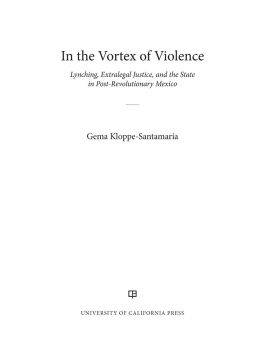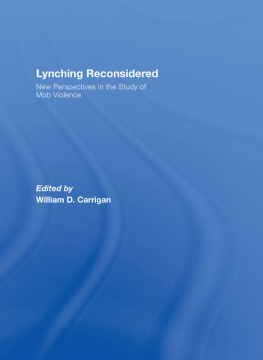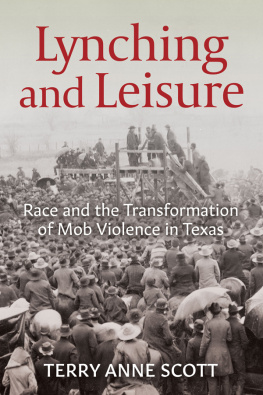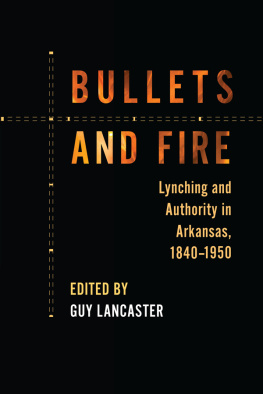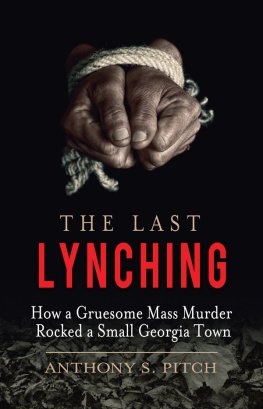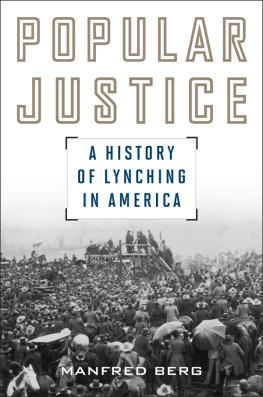In the Vortex of Violence
VIOLENCE IN LATIN AMERICAN HISTORY
Edited by Pablo Piccato, Federico Finchelstein, and Paul Gillingham
Uruguay, 1968: Student Activism from Global Counterculture to Molotov Cocktails, by Vania Markarian
While the City Sleeps: A History of Pistoleros, Policemen, and the Crime Beat in Buenos Aires before Pern, by Lila Caimari
Forgotten Peace: Reform, Violence, and the Making of Contemporary Colombia, by Robert A. Karl
A History of Infamy: Crime, Truth, and Justice in Mexico, by Pablo Piccato
Death in the City: Suicide and the Social Imaginary in Modern Mexico, by Kathryn A. Sloan
Argentinas Missing Bones: Revisiting the History of the Dirty War, by James P. Brennan
In the Vortex of Violence: Lynching, Extralegal Justice, and the State in Post-Revolutionary Mexico, by Gema Kloppe-Santamara
In the Vortex of Violence
Lynching, Extralegal Justice, and the State in Post-Revolutionary Mexico
Gema Kloppe-Santamara

UNIVERSITY OF CALIFORNIA PRESS
University of California Press
Oakland, California
2020 by Gema Kloppe-Santamara
Library of Congress Cataloging-in-Publication Data
Names: Kloppe-Santamara, Gema, 1979 author.
Title: In the vortex of violence : lynching, extralegal justice, and the state in post-revolutionary Mexico / Gema Kloppe-Santamara.
Other titles: Violence in Latin American history ; 7.
Description: Oakland : University of California Press, [2020] | Series: Violence in Latin American history ; 7 | Includes bibliographical references and index.
Identifiers: LCCN 2020006463 (print) | LCCN 2020006464 (ebook) | ISBN 9780520344020 (cloth) | ISBN 9780520344037 (paperback) | ISBN 9780520975323 (ebook)
Subjects: LCSH : LynchingMexicoHistory20th century.
Classification: LCC HV 6471. M 6 K 56 2020 (print) | LCC HV 6471. M 6 (ebook) | DDC 364.1/34dc23
LC record available at https://lccn.loc.gov/2020006463
LC ebook record available at https://lccn.loc.gov/2020006464
Manufactured in the United States of America
28 27 26 25 24 23 22 21 20
10 9 8 7 6 5 4 3 2 1
To my mom, Yelbita Balmaceda Vivas
q.e.p.d.
CONTENTS
Between Civilization
and Barbarity
ACKNOWLEDGMENTS
This book was made possible thanks to the support, guidance, and collegiality of many individuals and institutions. I am indebted first and foremost to my husband, Andrew Kloppe-Santamara, whose love, solidarity, and companionship allowed me to write this book with the energy, focus, and intellectual commitment it demanded. Not only did he read several drafts of the manuscript, but he also discussed with me at length the subject of this book and took care of our baby daughter, Emma, so that I could bring this book to fruition. Without him, this book would not have been possible.
This book began as a doctoral dissertation during my graduate years at the New School for Social Research in New York City. Throughout my doctoral studies I had the support of several institutions. I was a recipient of the FulbrightGarca Robles Fellowship and received support from Mexicos National Council of Science and Technology (CONACYT) and Secretariat of Public Education (SEP). At the New School, I was awarded a Deans Fellowship, a Janey Rothenberg Fellowship, and a Dissertation Fellowship. Archival and on-site research was conducted thanks to the financial support provided by the Janey Program in Latin American Studies at the New School. A pre-doctoral fellowship granted by the Center for U.S.- Mexican Studies at the University of California, San Diego (UCSD), allowed me to complete the writing of the dissertation.
In addition to this institutional support, during my doctoral studies I was fortunate to find inspiration and intellectual guidance from several scholars, many of whom continue to be close colleagues and friends. Pablo Piccato was from the very beginning a mentor, a source of inspiration, and a friend. Our conversations on the nature and character of violence have stayed with me over the years. At the New School, Federico Finchelstein, Eiko Ikegami, Robin Wagner-Pacifici, Andrew Arato, and Jeremy Varon encouraged me to think of the phenomenon of lynching and its reverberations from a critical, theoretical, and global perspective. My conversations with Michael Pfeifer on the history of lynching in the United States and beyond provided valuable insights and kept reminding me of the importance of bringing to the fore the history of lynching in Mexico and Latin America. At the New School, my colleagues and friends Hadas Cohen and Luis Herrn enriched my time in New York both personally and intellectually. On completion of the dissertation, I was awarded the Charles A. Hale Fellowship by the Latin American Studies Association (LASA) as well as the Albert Salomon Memorial Award in Sociology for best PhD dissertation by the New School.
The transformation of the dissertation into a book manuscript required substantial time, revisions, and original research, as I decided to widen the geographic scope of my dissertationoriginally focused on Pueblaand write a history of lynching in post-revolutionary Mexico as a whole. The resources needed for this endeavor were made possible by a 2016 Women in the Humanities Fellowship granted by the Mexican Academy of Sciences. With the support of this award, I was able to work with Fabiola Peinado, an insightful young historian who provided valuable research assistance throughout the development of the book.
The research needed to write this book was carried out during my time as an assistant professor at the Instituto Tecnolgico Autnomo de Mxico (ITAM). I am grateful to my colleagues as well as to my former students there, who allowed me to share my work at research seminars and interdisciplinary venues. Special thanks to Rafael Fernndez de Castro, Stephan Sberro, Vidal Romero, Catheryn Camacho, Rodrigo Chacn, Isabel Flores, and Juana Gmez. In Mexico City, I also found a wonderful network of scholars whose work on issues of security, violence, and democracy more broadly allowed me to revisit some of my original ideas. These include Andreas Schedler, Luis de la Calle, and Sandra Ley at the Centro de Investigacin y Docencia Econmica (CIDE); Celia Toro, Mnica Serrano, and Erika Pani at the Colegio de Mxico; and Elisa Speckman, Susana Sosenski, and Martha Santilln at the Instituto de Investigaciones Histricas at the Universidad Nacional Autnoma de Mxico (UNAM).
The writing of this book was made possible by a Visiting Fellowship at the Kellogg Institute for International Scholars at the University of Notre Dame in 201718. It provided the space, time, and intellectual environment that was required. I am especially grateful to Jaime Pensado for his friendship and generosity during my time at the Kellogg Institute. Special thanks are also due to Ted Beatty, Karen Graubart, Guillermo Trejo, and Luca Tascornia for their feedback and suggestions, as well as to Denise Wright and Therese Hanlon, who welcomed me to the Kellogg family. I also want to thank the members of the Mexico Working Group and of the Kroc-Kellogg Peace, Conflict, Crime and Violence Workshop for providing me with a venue to present and discuss early drafts of this work.
I had the privilege of finishing the writing and editing of this book during my first two years as an assistant professor of Latin American history at Loyola University Chicago. I found in Loyola an incredible group of scholars whose collegiality and support have made me feel at home in Chicago. I am most thankful to Stephen Schloesser who as chair of the history department made sure I had the time to complete this book. I am also thankful for the guidance and friendship I received from my colleagues at Loyola: Alice Weinreb, Edin Hajdarpasic, Suzanne Kaufman, Benjamin Johnson, Michelle Nickerson, Hctor Garca and especially Timothy Gilfoyle, who has been a wonderful and invaluable mentor.

